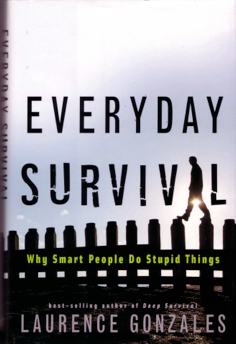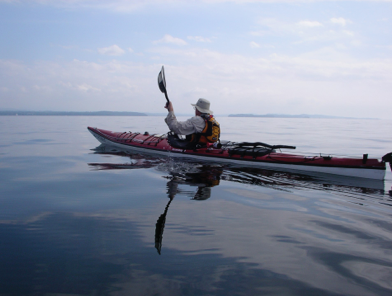
Book Reviewed: Everyday Survival: Why Smart People Do Stupid Things

Author: Laurence Gonzales
Publisher: W.W. Norton & Company, New York
Copyright Date: 2008
ISBN: 978-0-393-05858-3
Type: Hardcover
Reviewed by: Yackman
Yackman’s Rating: 7 out of 10 points
My Review: How do I begin to review this book? First, I’ll say that it’s not the book I expected it to be. Laurence Gonzales’ last book, Deep Survival, was an exploration of death and survival in extreme situations (the book is subtitled “Who Lives, Who Dies and Why”). It is an excellent book, which I will review at another time. I expected this book to be of a similar nature, but focused on much more ordinary situations in which people make inappropriate decisions, taking inappropriate actions that lead to injury or death.
In fact, the first third of the book does explore the psychological underpinnings of our decision-making and how it sometimes goes awry. These underpinnings are contained in two concepts: mental models, and scripts.
Mental Models: Human beings are constantly organizing information from the environment and constructing models to contain this information. For example, the first time you see a dog as a child, you have no reference for the model “dog”. With time and experience, you learn that a wide range of creatures, some short, some tall, some hairy, some hairless, some sleek, some blocky, all fit into the concept of “dog”. We build a mental model of what a dog is and every time we see a four legged creature, we compare it to this model and identify the creature as “dog” or something else matching some other model of a four legged animal. Once the model has been established, we can usually identify “dog” instantly, without conscious thought.
Scripts: Scripts are the behaviors we exhibit or actions we take in response to the model we have identified. For example, if our mental model of “dog” includes pleasant times with dogs and we see them as friendly, the script we run tells us that it is OK to approach a dog and expect it to receive our attention warmly. We don’t think about this action. We see a four legged animal, we identify it as a dog, our experience with other dogs has been positive, we run the script that says this dog will be friendly and is safe to approach. This all happens in an instant, without conscious thought. The model and script save us the effort of confronting every new situation as if it was our first experience with it. If the dog is friendly, our model is re-enforced, as is our behavior. If this dog snarls and snaps at our approach, we may be surprised. This unexpected behavior may cause us to adjust our model to “most dogs are friendly, but some are not”. It may also cause us to adjust our script so that in a new situation, we will approach a dog more cautiously until we know which kind of dog it is.
Gonzales gives a simple and funny example of a script over practiced and played out in a completely inappropriate and dangerous way. It seems that a new police recruit spent long hours with a friend practicing how to safely take a gun away from a criminal who had the jump on him. Over and over the cop would disarm his friend, then hand the gun back and do it again. One day, the real thing happened and all the training paid off, almost. The officer quickly disarmed the perpetrator, then just as quickly gave the gun back to him, just as he had practiced. That script had become so automatic that he could not vary it to be appropriate in the real situation.

Gonzales identifies one particularly dangerous model and its related scripts. He calls it“a vacation state of mind”. A vacation state of mind is one where we are in a relaxed state, with our defenses down. This makes us less able to experience our environment, to see what is really happening. He gives three examples from the 2005 tsunami in Indonesia.
There is video of a man standing on the beach as the sea pulled back for a huge distance, much further and faster than any tide. He stood there with his hands in his bathing suit pockets, watching as a huge wave built offshore. He didn’t move until the enormous wave, towering high above his head crashed down on him. He was never seen again. He was in a vacation state of mind. Even though what he was seeing was clearly unusual, his model for time at the beach said that beaches are benign places, and waves, even big ones, are part of being at the beach. Big waves are beautiful to watch and fun to play in, so his script said, “Let’s stay and see what happens. This could be fun.” Even with the enormous wave bearing down on him, about to engulf him, his model and its related script didn’t change, and he died.
On the same beach was a ten-year-old girl. She saw the sea pull back and became alarmed. She was remembering something in the back of her mind about tsunamis, something she had studied in school. She ran up the beach screaming for people to move to higher ground. Many people followed her and one hundred were saved. She had had less time to build a model of “beach” and had fresh information about possible dangers at the beach. She instantly changed her script from “let’s stay and watch”, to “run for your life”, and many people lived as a result. She had been able to break out of that vacation state of mind.
The final example was of a man and his buddies who had been out partying late the night before. While the others slept in their first floor hotel room, this fellow sat on his patio drinking coffee and enjoying the morning. Then he noticed the sea pull back. His model of beach included an experience with a much more benign tsunami when he was much younger. He immediately set his vacation state of mind aside and ran the script that said he and his friends were in danger. He quickly went inside and roused his buddies, dragging them complaining to the hotel’s forth floor. From that vantage point they could see the disaster unfolding around them, with the knowledge of their certain death in the flooded floors below them had they not moved quickly.

So what does this say to paddlers like us? I think it is easy, especially for the inexperienced paddler, to get into a vacation state of mind about kayaking. The mental model that most inexperienced paddlers have is that kayaking is a benign sport with few dangers. Thus we see many paddlers on our lakes and rivers without spray decks and with PFD’s stowed on deck or somewhere in the cockpit. Those of us who paddle more extensively and in all kinds of conditions see this as foolhardy. Our mental model includes sudden thunder squalls, unexpected powerboat wakes, sudden shifts and increases in wind. We know that it is too late to put on your PFD when you need it. We know that a spray deck can keep you afloat when waves are washing across the boat. Our mental model, based on greater experience keeps us more alert to changes in our environment, which then drives action.
I found this discussion of models, scripts and a vacation state of mind interesting, useful and relevant. The rest of the book pursued ideas that in my mind were connected to the idea of survival, but in largely abstract and philosophical ways. And while I found them very interesting, I struggled to maintain the connection with survival.
For instance, Gonzales spends a lot of time talking about energy and entropy. He talks about the energy in stars, bacteria and human beings (among many others) and how the high energy in these things moves to areas of low energy. He sees these things as channels for moving energy and achieving entropy. As an example, imagine a steaming cup of coffee sitting on a table in a cold room. The heat in the coffee represents energy, higher than the energy in the cold room. The heat from the coffee quickly radiates into the cold room, warming it ever so slightly until the coffee and the room reach the same temperature. A sort of equilibrium sets in, entropy has occurred.
Gonzales postulates that we are the prime movers of energy on the planet, dissipating huge amounts of energy, quickly moving the planet toward entropy. He connects this discussion to survival by saying that if we continue to use our existing models of living, which drive scripts causing us to use more and more resources, our species will ultimately fail. He makes a strong argument that life will continue through the examination of many organisms living in what we would consider places where life could not exist. But human life will not necessarily continue, unless we adjust our models and scripts to accommodate the new circumstances.
While Gonzales’ science writing is clear and accessible, his prose approaches poetry. Here is an excerpt from his description of a night spent with a colleague on a dry lakebed out west.
“On the night that Jonas and I spent out on that dry lake bed, I made a fire from the thorny greasewood bushes. The sun withdrew behind the mountains as the wind picked up and made the flames roar like a smelter, and drove orange cinders in wild arcs across the lake. I watched them bounce along until they dimmed and vanished in the distance. The vast empty land stretched away from the fire’s nervous glow, and the tarp snapped in the wind, as we sat and watched Cassiopeia rise across the misty wheel of the galaxy. Mars and Jupiter towed a hollow moon up through a far deck of stratocumulus. Holes in the clouds sent spotlights down across the white land and made a death’s head of the moon, until it breached the wall of clouds, luring mountains out of the dark. Above the cold moon, the Milky Way faded, and a million worlds winked out. The desert glowed all night with an eerie chemical light” Pg 255
That writing is so rich and so real that I can close my eyes and experience the feel and the smell and the sight of that night. There are moments of writing like that all through this book.
A common thread through out this book is Gonzales’ search for the origins of life. He traces our ancestry, following the trail back through exotic life forms to the first cells that contained life and concludes that given the abundance and diversity of life and of the elements that created it, life, simple living cells to complex beings, is inevitable. He sums this up in the final paragraph of the book.
“I cast myself across the land in search of enlightenment, and here is what I found: that matter and energy are one continuous flow. Nothing remains except the process. And that matter is so full of energy that it sometimes has to get right up and dance. And when it does, we call it life.” Pg 258
I do not understand everything in this book and there is much I have left out (self organizing systems, for instance), but this book makes you think. And in many ways it is a complement to Alan Weisman’s book, The World Without Us. I don’t recommend Everyday Survival for everyone, but if you find anything described here appealing or challenging, please read it. I’m glad I did. I will be digesting Everyday Survival for a long time.

1234